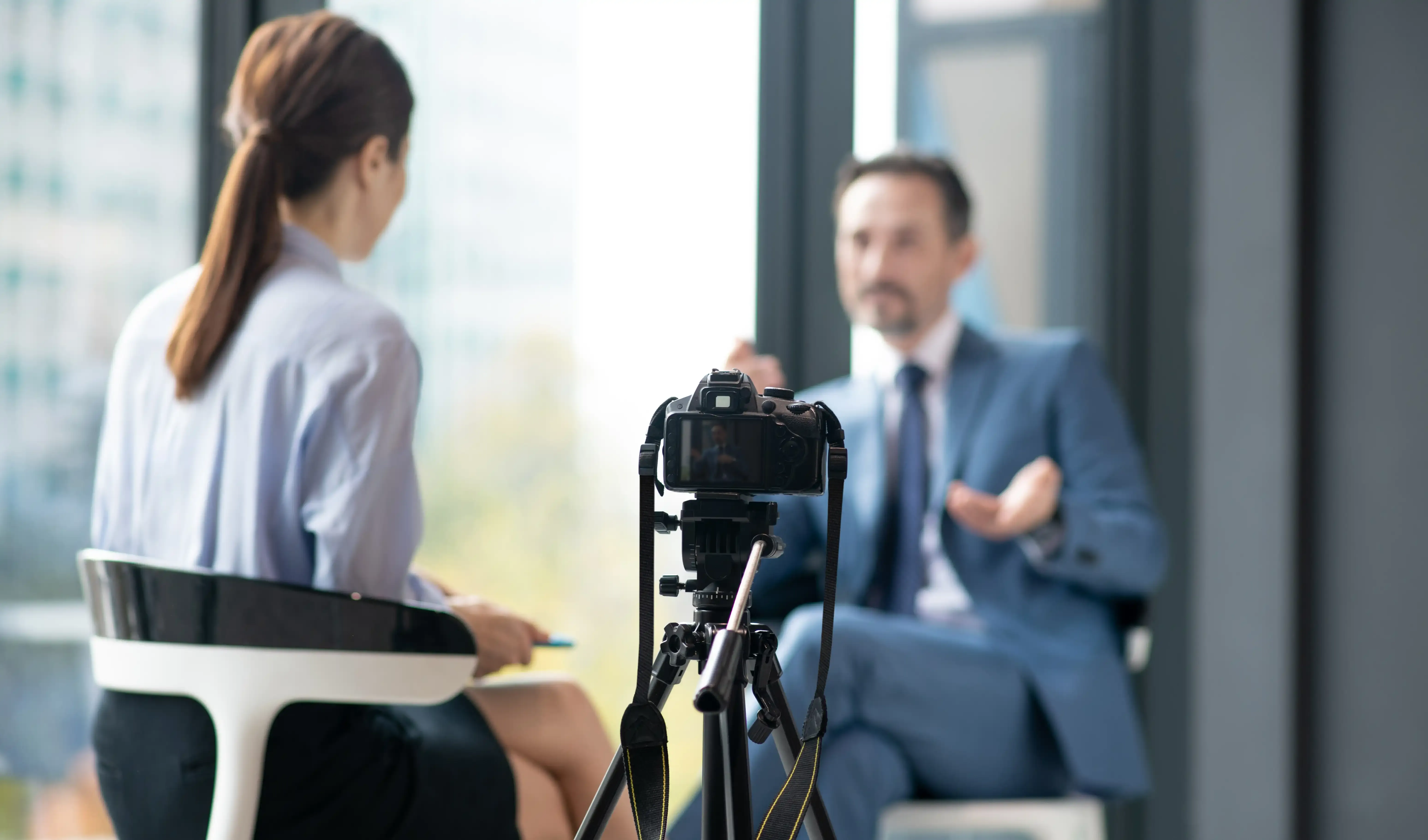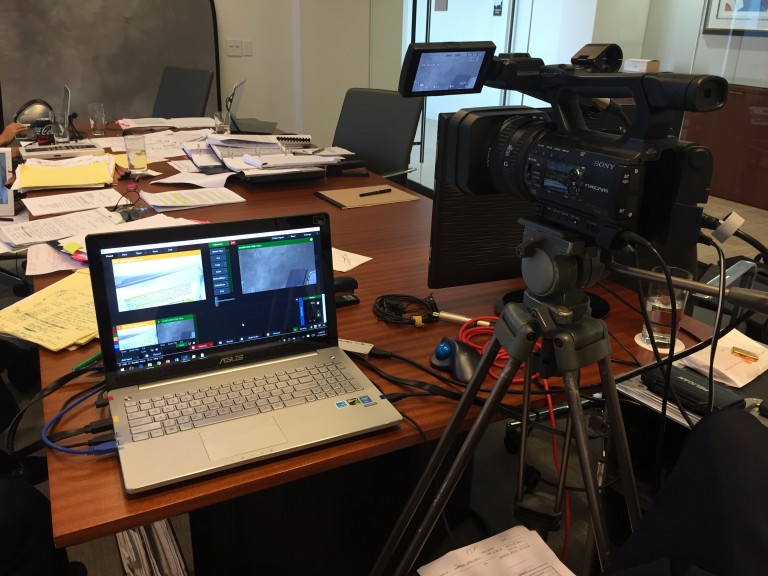The psychology of non-verbal communication in legal video depositions
The Relevance of Lawful Video Depositions in Modern Legal Services: What You Should Know
Lawful video clip depositions have actually ended up being necessary in today's legal landscape. They provide a multidimensional sight of witness testaments that standard transcripts simply can not match. By catching both non-verbal and verbal interaction, these depositions improve the overall understanding of a witness's reliability. Nevertheless, the effectiveness of video clip depositions depends upon numerous variables, including compliance with legal standards and ideal methods (legal video depositions). Checking out these components exposes their real relevance in modern lawful services
What Are Legal Video Clip Depositions?
Legal video depositions function as a vital tool in the litigation process. They entail videotaping witness statements in a video style, capturing both non-verbal and spoken interaction. This approach allows lawyers to record the demeanor, expressions, and responses of witnesses, giving a richer context for the testimony. Typically carried out in a controlled environment, these depositions are led by attorneys who ask questions while a court press reporter documents the discussion. The resulting video clip can be vital for test prep work, as it allows attorneys to analyze the trustworthiness of witnesses and refine their strategies. Additionally, legal video clip depositions can be used in different legal contexts, varying from civil disputes to criminal situations. The visual and acoustic elements of video depositions boost the discussion of evidence, making it an essential part in the modern-day lawful landscape. In general, they contribute significantly to the efficiency and efficiency of lawful proceedings.

Benefits of Video Clip Depositions Over Standard Techniques
Video clip depositions offer various advantages compared to conventional approaches of taking witness testaments. One significant benefit is the capability to catch both visual and audio aspects, offering a much more extensive record of the witness's statements. This dual format improves clarity and allows attorneys to reference particular subtleties throughout test prep work. Additionally, video clip depositions facilitate remote involvement, making it less complicated for witnesses who might be not available for in-person appearances because of geographical restraints or health issues.Moreover, video clip depositions can expedite the total deposition process, lowering the time and prices related to travel and logistics. They additionally boost ease of access, as taped depositions can be easily shared among lawful teams and referenced at any moment. This comfort adds to better case management and prep work. On the whole, video clip depositions represent a modern, efficient strategy to collecting witness testimonies, lining up with the evolving needs of the legal profession.
The Function of Body Language and Tone in Testimonies

In legal video clip depositions, body language and tone play crucial duties in sharing a witness's trustworthiness and reliability. Nonverbal hints can give insights right into a witness's mood, affecting how their statement is perceived. Comprehending the influence of these elements is crucial for attorneys and jurors alike when assessing the dependability of a testimony.
Nonverbal Interaction Insights
While spoken communication is frequently highlighted in lawful testimonies, nonverbal cues such as body language and tone play an important role in communicating reliability and emotion. Onlookers of depositions may keep in mind that a witness's position, motions, and face expressions can considerably affect understandings of integrity. Regular eye call might signify confidence, while staying clear of gaze could recommend dishonesty or discomfort. The tone of voice-- its quantity, rate, and pitch-- can pass on feelings of genuineness or unpredictability. Lawful professionals need to be in harmony with these nonverbal signals, as they commonly give crucial context that enhances spoken words. Comprehending these nuances can improve the performance of depositions and influence the outcome of legal proceedings.
Emotional Tone Effect
The psychological tone shared during lawful testimonies greatly impacts just how a witness is perceived. Body language, singing inflections, and facial expressions play essential functions fit the story of a statement. A witness showing self-confidence via steady eye get in touch with and a tranquil tone can impart a sense of dependability and engagement. Alternatively, signs of anxiety, such as fidgeting or an unstable voice, might cause skepticism regarding their account. The nuances of psychological expression can affect the interpretation of facts, making it essential for attorneys to identify these hints. In video depositions, the aesthetic and auditory parts integrate, highlighting the significance of emotional tone in communicating genuineness and truthfulness within the lawful procedure.
Reliability and Trustworthiness
A vital consider developing integrity and trustworthiness during testaments lies in the witness's body movement and intonation. Onlookers usually depend on non-verbal cues-- such as eye call, position, and motions-- to assess a witness's genuineness. For instance, a witness who keeps eye call and displays open body movement might be perceived as even more reputable and straightforward than one that prevents eye contact or appears blocked. Furthermore, intonation plays an essential role; a stable, tranquil tone can strengthen the reputation of the testament, while changes in pitch or volume may increase questions. Eventually, the combination of body language and vocal tone substantially affects just how a witness's declarations are obtained and translated in a legal context.
Ideal Practices for Carrying Out Video Depositions
Performing video depositions needs mindful planning and execution to ensure a reliable and clear presentation of testament. It is important to choose a peaceful, well-lit location to minimize disturbances and secure ideal video quality. The equipment must be checked ahead of time, including cams, microphones, and lighting, to prevent technical view it now concerns during the deposition.Next, parties entailed have to review the layout and procedures beforehand, making sure that every person comprehends their functions. The deponent should be informed on the procedure, including how to respond plainly and concisely.Additionally, preserving a specialist attitude throughout the session is necessary. This includes avoiding speaking over each other and validating that all questions are directed suitably. Ultimately, it is essential to videotape the deposition in a layout that permits simple playback and review, maintaining the honesty of the testimony for future use.
Legal Considerations and Compliance Issues
Just how do lawful factors to consider and compliance problems impact the efficiency of video clip depositions? Attorneys must navigate a complicated landscape of guidelines, making sure that video clip depositions adhere to jurisdictional policies and criteria. Conformity with laws concerning personal privacy, permission, and videotaping techniques is crucial. For example, obtaining explicit permission from all parties involved is required to avoid legal repercussions.Additionally, the admissibility of video evidence in court can depend upon conformity with step-by-step needs. Ensuring that the equipment used meets technological standards is additionally crucial, as poor quality can threaten the deposition's reliability.Moreover, attorneys have to recognize any type of specific state laws that control video clip depositions, as these can vary greatly. Failure to resolve these factors to consider can not just threaten the honesty of the deposition however additionally impact the general situation technique, ultimately influencing the client's lawful results.
How Video Depositions Impact Court Assumption
While video clip depositions can offer as effective devices in legal procedures, their impact on jury understanding is substantial. The aesthetic and auditory aspects of video recordings offer jurors with a much more thorough understanding of witness behavior, integrity, and emotional actions. This multimedia strategy can enhance the jurors' capability to assess the dependability of testimony compared to standard text-based transcripts.Moreover, video clip depositions permit jurors to observe body movement, tone of voice, and faces, every one of which can influence their interpretation of the witness's statements. The presence of a witness on screen can humanize them, promoting empathy and connection, which may guide jurors' opinions. Conversely, a witness that shows up undependable or evasive on video clip may bring about unfavorable assumptions that affect a court's choice. Eventually, the dynamic nature of video clip depositions plays an important function fit exactly how jurors interpret continue reading this proof and reach their judgments.
The Future of Video Clip Depositions in Legal Technique
As innovations in innovation remain to improve the legal landscape, the future of video depositions is poised for substantial evolution. Innovations such as synthetic intelligence, digital reality, and enhanced video clip conferencing devices are anticipated to enhance the deposition process and enhance availability. Attorneys may make use of AI-driven analytics to examine witness credibility and case strength much more effectively.Moreover, the assimilation of online find here fact can permit courts to experience immersive simulations of depositions, offering much deeper context and understanding. Additionally, the trend towards remote depositions is likely to continue, supplying greater flexibility for customers and attorneys alike.As remote job becomes progressively stabilized, video clip depositions will likely end up being standard method, decreasing prices and time restraints connected with standard approaches. On the whole, these technological innovations promise to improve the performance, effectiveness, and availability of video clip depositions in legal method, inevitably transforming just how lawyers plan for test.
Frequently Asked Concerns
Just How Much Do Legal Video Clip Depositions Typically Cost?

Can Video Clip Depositions Be Used in Any Kind Of Instance?
Video depositions can be utilized in numerous sorts of cases, including civil, criminal, and family regulation. Their flexibility allows attorneys to existing witness testimonies properly, adapting to the details needs of different legal circumstances.
What Equipment Is Needed for a Video Clip Deposition?
To perform a video clip deposition, crucial tools consists of a high-quality electronic camera, microphone, lighting, and a dependable recording tool. Additionally, a computer with editing software application may be needed for post-production and formatting the final video clip.
For how long Does a Common Video Deposition Last?
A typical video deposition lasts in between 2 to 4 hours, depending upon the complexity of the case and the variety of inquiries presented. Prolonged sessions may happen, yet breaks are normally included for participant convenience.

Are Video Clip Depositions Admissible in Court?
Video depositions are usually permissible in court, supplied they stick to legal requirements and rules of evidence. Their usage improves quality and protects witness testimony, aiding in the judicial process during hearings and tests. Lawful video clip depositions have become essential in today's legal landscape. Additionally, legal video clip depositions can be used in numerous legal contexts, varying from civil conflicts to criminal cases. Furthermore, video depositions assist in remote engagement, making it easier for witnesses who may be inaccessible for in-person appearances due to geographical restraints or wellness issues.Moreover, video depositions can quicken the total deposition procedure, minimizing the time and costs connected with traveling and logistics. Ensuring that the devices utilized fulfills technical standards is additionally vital, as poor high quality can weaken the deposition's reliability.Moreover, lawyers need to be conscious of any kind of specific state regulations that control video depositions, as these can vary substantially. In addition, the trend toward remote depositions is most likely to persist, using higher versatility for clients and attorneys alike.As remote work becomes progressively stabilized, video clip depositions will likely end up being basic practice, reducing costs and time constraints linked with standard approaches.